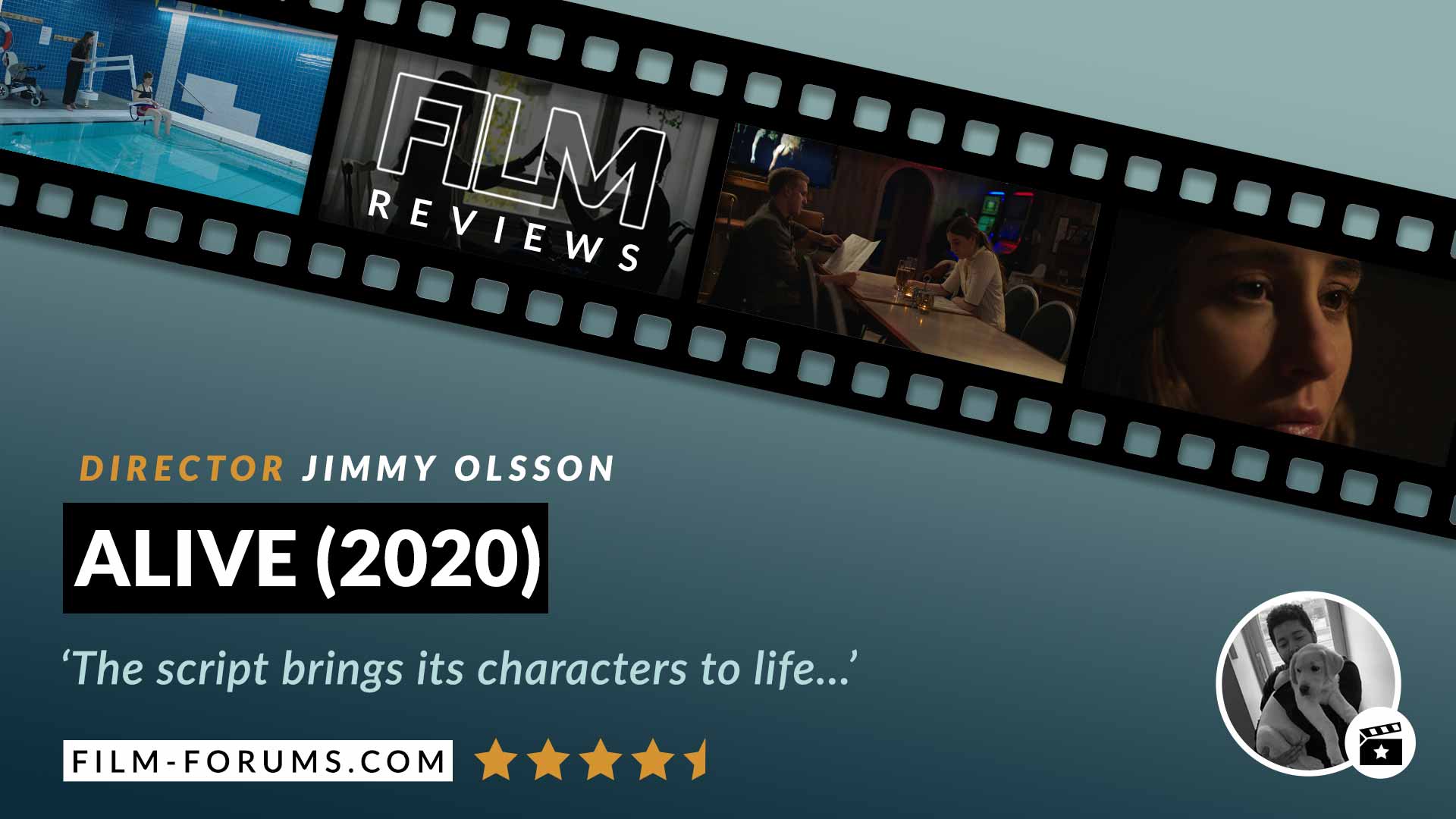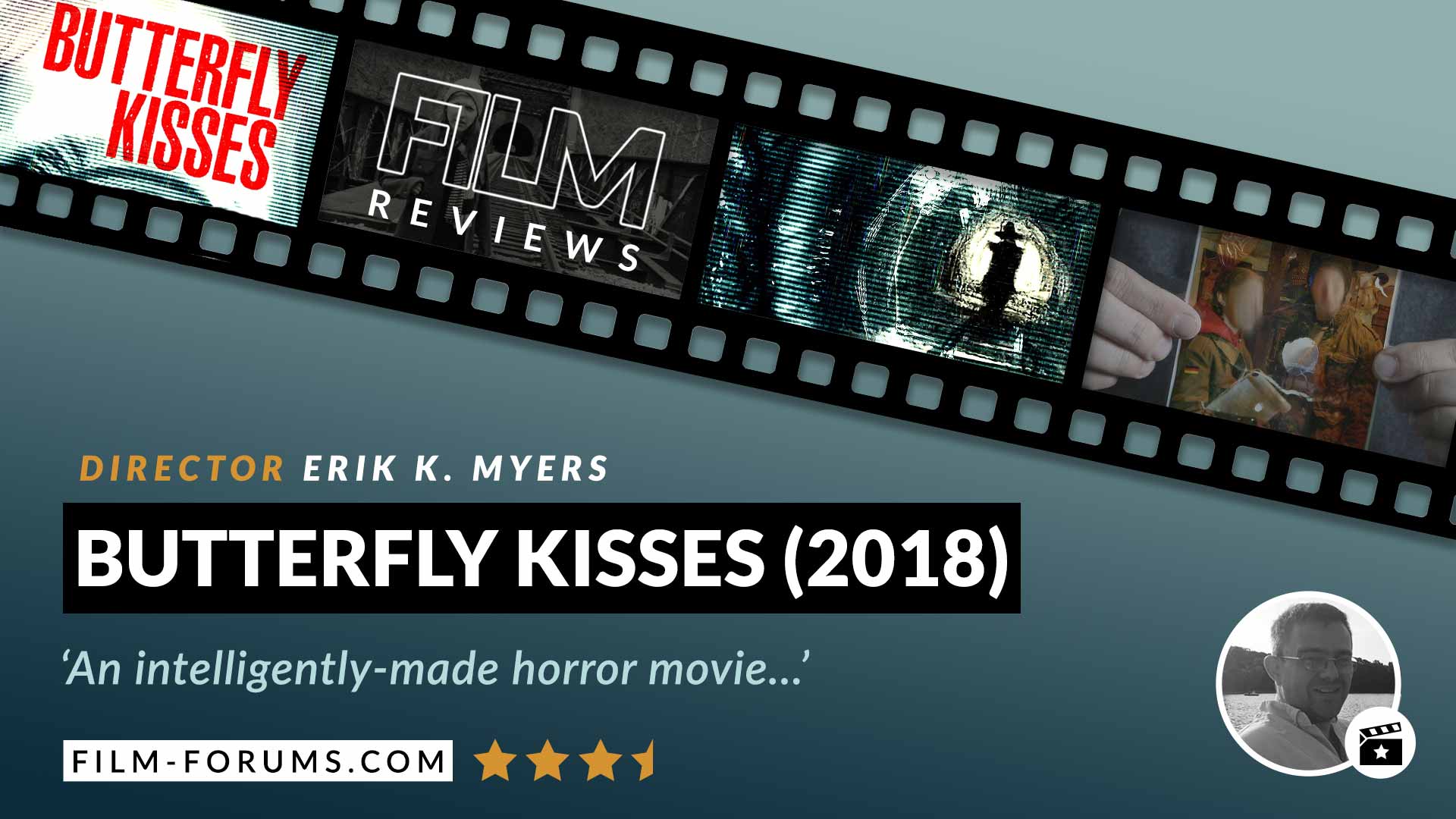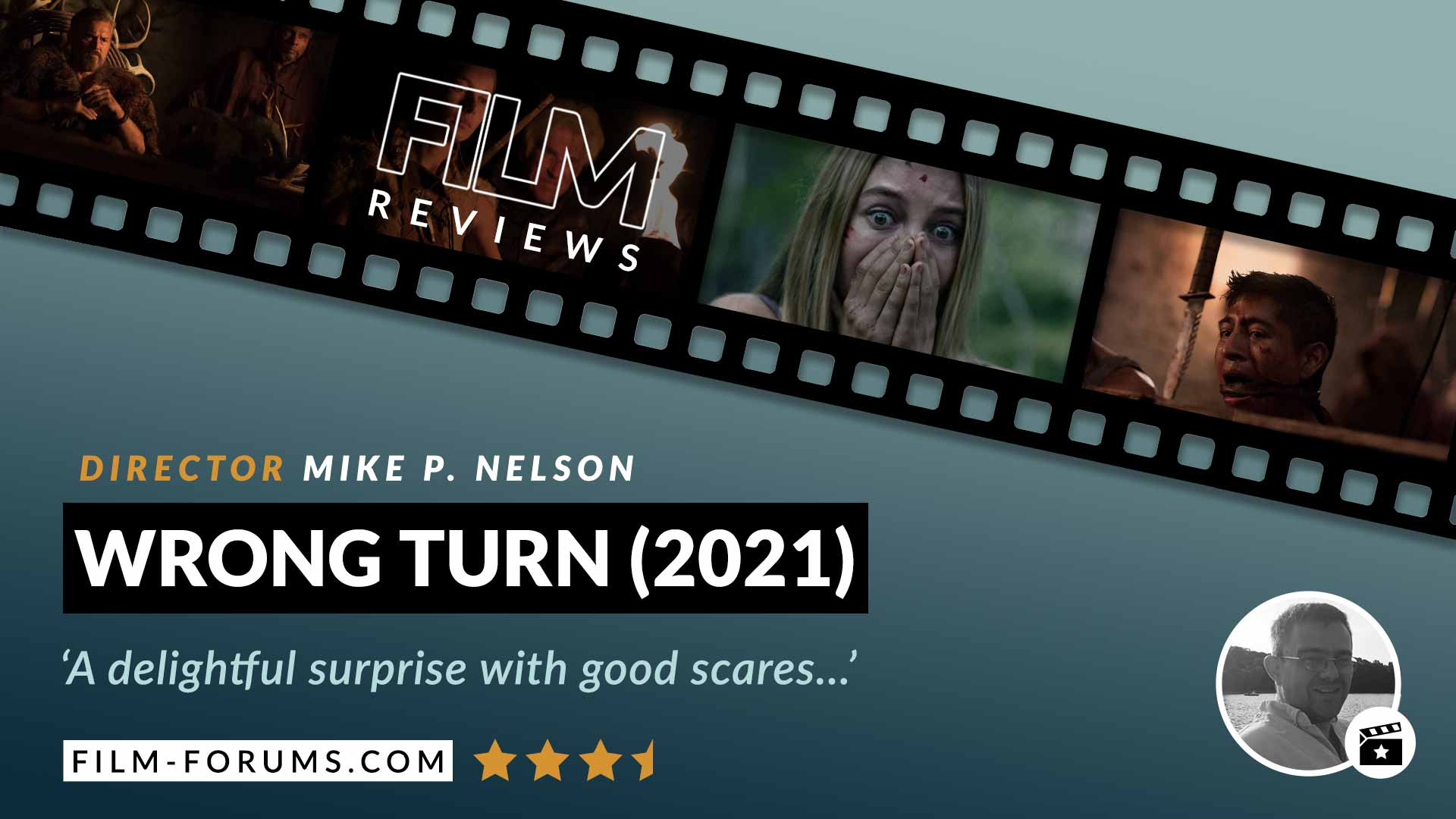We wake up in a cinematic blue teal colour grade with Lilith (Shaylyn Gibson) and her attentive, affectionate husband, Adam (Scott Hume).
It’s clear from the offset that Lilith has been unwell for some time and that Adam cares for her, by helping her get motivated in the mornings so she can take care of their house.
Content warning: mentions of domestic abuse and sexual violence. You can watch the full movie at the end of this review.

Hitchcock or Cock-up?
The beautiful camera work and colour grade with ominous music allows us to feel Lilith’s grogginess and drained demeanour which immediately make me think that she is struggling with her mental health or has a chronic physical condition and Adam is likely her primary carer.
Lighting on Adam, however, is similar to that employed with Hitchcock’s Norman Bates in that we often see his face cast half in light and half in shadow.
Is it poor lighting, typical of a low budget indie film, or a symbolic choice in line with the director that made the stylistic choice so famous?
As Lilith gets herself together, our concerns over her health are partly confirmed as we see a sheet of indiscernible medication on her dresser with four tablets missing.
The beautiful but vacant Lilith meekly makes her way to the bathroom and looks into the mirror, giving herself the verbal affirmation: ‘Today is going to be a good day’. This begs the question: when was her last ‘good day’?

Visibly in pain, she empties her bladder and finds blood on the tissue as she wipes herself.
Now, as the viewer, I am alarmed. I can’t help but think her symptoms are very typical of a UTI or cystitis, at best, and various life-threatening options at worst.
Concerned, Lilith vents her worries to Adam (seemingly not for the first time) and almost pleads with him to see a doctor. He immediately goes from the loving carer to a very dismissive and derogatory man who seems quite frustrated by her “request” to see a doctor. He assures her it’s nothing and that she will only look stupid if she goes to get it checked out.
What does love look like?
Here’s our first red flag from Adam. Anyone who truly cares about you will not tell you that you will look stupid for checking on your health; they will encourage it and say that it’s better to be safe.
Immediately I asked: ‘What’s this jerk hiding?’, especially given the many worries I already have about Lilith’s health. Is he the cause? Has he given her an STI/STD by cheating on her? Is she injured down there for some other reason?

As the day goes on, we see her looking very drab, covered up and lacking colour in every way but slowly gaining the strength to get the household tasks done and nervously answer the door to a delivery.
She also rejects a call from ‘Mummy <3’, suggesting that, at one point, they had a very close relationship. It becomes clear from the voicemail that Irish Lilith’s family does not live nearby but will soon be visiting London and would like to see her.
Her confused demeanour and physical weakness appear to completely subside as the hours go by as she enjoys exploring her wardrobe. We make a distinct switch from eerie atmospheric music to an upbeat instrumental that she dances along to as she gets glammed up for Adam’s return from work. And when I say ‘glammed up’, I mean – wears an elegant knee length dress and some earrings with her beautiful natural hair loose and very simple make up.
Adam, however, greets her as if she has bounced up to him in a head-to-toe bondage outfit, suggesting they hit the town in nothing but leather belts and nipple tassels.
He is visibly angry at the sight of her looking like her true self: happy, confident and attractive. He challenges her for an explanation in the most condescending way and then remarks that he hopes she didn’t look like that when the delivery arrived.

Abusers of his cloth seek out beautiful people and tear them down one stitch at a time until they forget their identity – believing that the Adams of the world are the only ones who will have them. I remember an ex of mine watching me put on some simple make-up for an audition and asking me, ‘Why do you look like a whore…are the directors hot?’
Spotting the warning signs of an abusive relationship
It’s important to note that despite popular belief, abusers can have any genitalia between their legs, which this very accurate film informs its audience of in the statistics at the end: 1 in 3 victims of abuse are actually men.
So, keep in mind, when spotting an abuser, that they can come in any shape, size or gender and it’s not about who is more physically strong or capable – it’s about control.
So, here we are with red flag number 2 for the charismatic and “loving” Adam – he wants her to look her worst all the time. Who in the world honestly wants their partner to be unattractive all the time? And why is it such a red flag?
Domestic abuse is not simply someone punching you in the face or beating you to within an inch of your life right away. It’s much more nuanced than that.
It takes time to get a victim acclimated to the point where they will feel they cannot walk away from such behaviour when it does happen. A slow and steady approach is often used, so we must be aware of the earlier signs – like we get to see here – and reach out for help while we still have the strength.

Purgatory (2021) is a perfect glimpse into the mid-phase of what will become a very dangerous relationship. As we come back to our couple enjoying his requested meal, with Lilith’s hair now up because he insulted how she looks with it down, the topic changes to her mother’s visit as Lilith tries to negotiate time with her family – an example of isolation from the victim’s natural support network.
Lilith is reminded by Adam that they see HIS mother every week on that day and so they cannot see her mother. His anger intensifies as she tries to justify seeing her mother instead of his and he bursts out about how her mother has spoken about him in the past, eventually losing his temper and forbidding the visit.
Crucial piece of writing coming up and great restraint shown by the actor here. Instead of attacking Lilith (which is what the audience may be expecting), as it’s still early days in this abusive relationship he takes from another page of the abuser’s playbook: ‘I won’t hit you but I’ll let you know I could have’, as if they get brownie points for their self-control.
So, he doesn’t smack her – he squashes up the lovely food she’s made and throws it towards her and around the room instead to intimidate her. If that isn’t abusive enough, he then demands that she clean it up as if it were her that just behaved like an animal.
That’s what we call victim-blaming.
What’s love got to do with it?
The handheld camera work does a fantastic job here of showing how emotional she is feeling and I have to give such deep respect to Peter Garajszki for his cinematography as the camera only stabilises when Adam comes to console her because he is still her “safety” and constant in her mind.
This Jekyll and Hyde behaviour is very typical and should not be confused with the inherently evil character we dream up when we think of an abuser – those are much too easy to spot in the crowd and that’s not the reality.
The best, or rather worst, abusers are masters at assimilation, charisma and faux loving of their partners. They bide their time for maximum impact because they know that if they show all of themselves at once, they’ll be rejected. In a relationship or not – it’s illegal.
Adam then goes on to jokingly, but still quite forcefully, persuade her to drink the wine she didn’t want, only to treat her with contempt and judgement later as she appears intoxicated while getting into bed.
She considers taking her medication, which is now revealed to be sleeping pills, but Adam discourages her because she’s had too much alcohol to mix with them apparently. She reluctantly puts them down – concerned she won’t rest well.

As she falls into a clinically deep sleep regardless, we see the rest of his true colours as he violates her unconscious, lifeless body and the colour grade fittingly turns to red.
We awake with Lilith and Adam again, as if it’s groundhog day with the same sequence of him waking her. Only now, when she administers her eye-drops, we see that there are nine empty tablet blisters, in contrast to the four the previous day. I’ll allow you to do the math.
We follow her to the bathroom for the second time where Lilith looks more pale, more exhausted and indescribably disorientated as she proceeds to sit on the toilet. There is increased blood in her urine and the term ‘peeing glass’ comes to mind as I emotionally watch her burst into tears from her injuries.
After a moment to collect herself she gets up to the mirror and says, ‘Today’s going to be a good day.’ No sweetie, it’s not. You’re being abused and he won’t allow you another good day for as long as he has you in his grip.
Blue Muse Production’s use of a filmmaking budget
As you can probably gather, my opinion is that this film brilliantly captures the subtleties of domestic violence and how cunning an individual can be. Like many women, Lilith has no idea she’s being abused but deep down feels something is wrong. She doubts her own body, her mind, her family – everyone and everything but him.
Purgatory (2021) looks to me like a £20K-£25K short film from an experienced filmmaker with a detailed brief from a victim support group. In truth, Purgatory (2021) is writer Jack Stockley’s directorial debut and was made on a very humble £5K budget, which I can’t quite wrap my head around to be honest.
The casting could not have been better. Sure, it’s a cast of just two, but when your two are those two, your audience is going to be absorbed no matter what.
I loved how I was led to slowly hate Scott Hume’s character, which would never have happened had he not been so convincing as both the carer and the abuser. Many actors, when playing a villain-in-hiding, give the game away much too early and it elated me that Hume did not fall into this trope.

By the same token, Shaylyn Gibson was astonishing in her heart-breaking portrayal of Lilith. I was instantly invested in her which only grew as the truth became clear.
I can genuinely say, for a 22 minute short glimpse into such an immensely complex issue, everyone more than did their job. The colour grade by Sara Buxton was cinematic and enhanced throughout, so much so that it added at least a few thousand pounds to the overall perceived production value of the film. Peter Garajszki and Cameron Rozard did an excellent job in their respective roles as cinematographer and editor to move this story along with beautiful and effective visuals.
This may be Stockley’s first film, but the wise choices he has made in building the right team excites me for whatever he produces next. If he can make this on £5K, just imagine what he could do with more!
If you are reading this review and recognise any of the red flags mentioned, no matter how small, discuss them with a professional. They will have no bias towards your partner or parent ( domestic violence is often a family issue) and therefore can give you genuine focused support.
Please know that there is care, protection and genuine love out there for you as well as practical means to help you leave.
If you’re based in the UK, call the National Centre for Domestic Violence on: 0800 970 2070 for support to leave that situation, no matter how bad it has gotten at this time because it can, and will, always get worse.
To support any of the charities that have endorsed Purgatory (2021), please go to: www.purgatory.online for more information.
[usr 5]
Credits
Editor: Keren Davies
Second Editor & Artwork: Richard Williams
Special Thanks to Blue Muse Productions
Scottish Tunisian actress. Yes, that's a thing. BAME. POC.
English Literature and Creative Writing graduate. Writer, film nerd, book lover.
I own this thing. Being creative makes me tick. Film lover. Coffee hater. Website manager, headline and copywriter, video editor, graphic/motion designer, editor, presenter...











